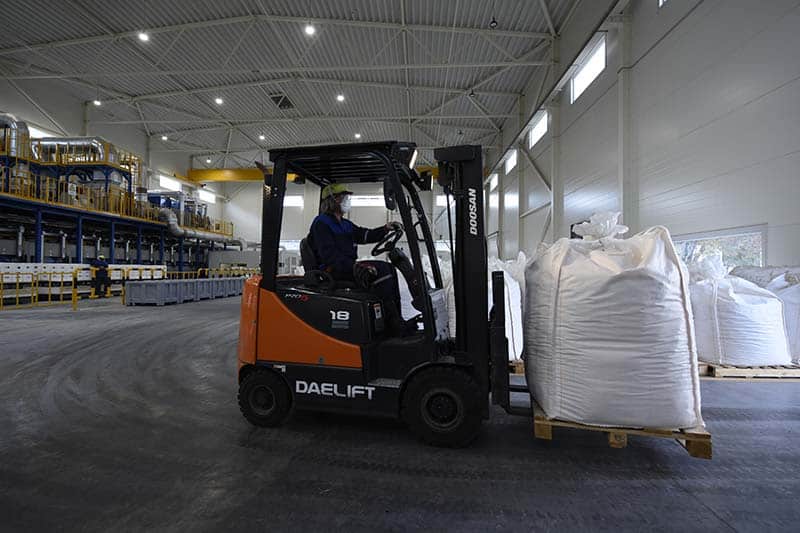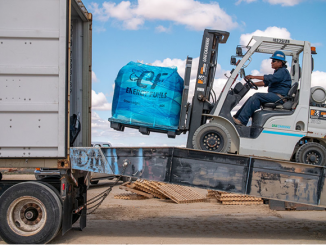
Neo Performance Materials Inc. is pleased to announce that its European rare earth and rare metal processing facility in Estonia – the only operating commercial rare earth separations and rare metal processing plant in the European Union – has been awarded a Gold Medal by EcoVadis for its 2021 sustainability programs. This places Neo’s Silmet facility in Sillamäe, Estonia in the top five percent of all facilities around the world reporting to EcoVadis for its sustainability programs in 2022.
The Silmet facility processes mixed rare earth feedstock into a variety of high-purity rare earth specialty materials, including neodymium-praseodymium (“NdPr”) oxide, which is used by Neo’s Magnequench business unit to produce neodymium-iron-boron (“NdFeB”) magnetic materials and magnets for automotive, factory automation, home appliance, circulation pump, and other applications.
It also produces environmental vehicle catalyst materials, which help reduce harmful emissions from cars and trucks, as well as high-purity niobium and tantalum metals. The plant operates under several ISO certifications, including ISO-9001, ISO-14001, and ISO-45001.
“I am very pleased and proud of our entire Estonian team for achieving a Gold Medal from EcoVadis for its 2021 sustainability performance and for doing so well in our first year of independent EcoVadis review,” said Jeff Hogan, Neo’s Executive Vice President and head of the company’s Chemicals and Oxides unit. “This recognition by EcoVadis helps to illustrate to our customers and stakeholders that Neo takes sustainability and environmental protection very seriously.”
“Our team has been working very hard to meet the high standards for sustainability programs set by EcoVadis, and this award recognizes their successful efforts,” added Raivo Vasnu, Silmet’s Managing Director. “We look forward to continuing to improve further on our sustainability performance.”
Neo currently is examining plans to expand the Silmet plant’s rare earth processing capacity, as well as to potentially establish sintered NdFeB magnet manufacturing in Estonia. Sintered NdFeB magnets are the world’s strongest permanent magnets and are crucial components to an increasing number of electric vehicle models, advanced wind turbines, and other technologies.
All of Neo’s Primary Rare Earth Facilities Now Operating in the EcoVadis System
This award marks the third Neo rare earth facility to have achieved top marks for sustainability efforts from EcoVadis this year. Neo Magnequench facilities in Korat, Thailand and in Tianjin, China earned Gold and Silver Medals, respectively, earlier this year.
All five of Neo’s flagship rare earth facilities, representing approximately 90% of revenue generated by the Company, are now operating in the EcoVadis tracking and reporting system. Leadership in global sustainability has been a key pillar of Neo’s long-term growth strategy. Neo expects to issue its first formal sustainability report in the second quarter of 2022.
Many of Neo’s products help reduce air and water pollution and enhance sustainability. This video provides examples of how Neo delivers the sustainable technologies of tomorrow to consumers today.
In addition to its work with EcoVadis, Neo is a participant in the United Nations Global Compact, the world’s largest corporate sustainability initiative, and has committed to implementing the Global Compact’s 10 Principles on human rights, labour, environment, and anti-corruption. The Company also is a member of the Responsible Minerals Initiative, which provides companies with tools and resources to make sourcing decisions that improve regulatory compliance and support responsible sourcing of minerals from conflict-affected and high-risk areas.
“Health, safety, and environmental performance have been at the core of Neo’s culture over our three decades of operating in the rare earth processing industry,“ said Constantine Karayannopoulos, Neo’s CEO. “Long before sustainability and ESG emerged as formal concepts in the manufacturing community, Neo was leading our industry with sustainability innovations, such as recycling magnetic rare earth materials and rare metals, and processing end-of-life and post-industrial scrap materials into specialty metals such as indium, hafnium, rhenium, and gallium. Neo’s business model has long emphasized operating under circular economic models as much as possible, as this makes good sense from both an environmental and a business perspective.”



